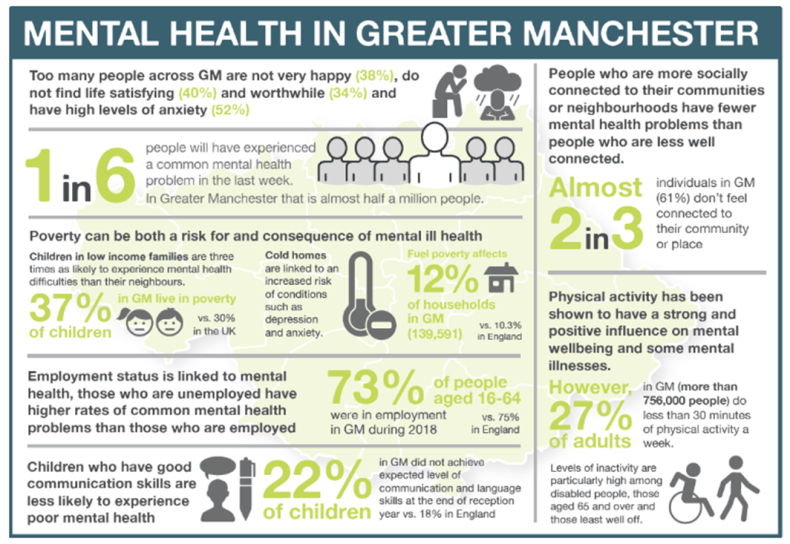Taking a whole-system approach to mental wellbeing: Greater Manchester
Overview
Greater Manchester Health and Social Care Partnership engaged with over 4,000 local people to inform its mental health recovery planning and prioritisation process in the wake of the COVID-19 pandemic. The engagement has led to the development of free support programmes for local residents, improved collaborative working on mental wellbeing and influenced investment proposals for 2021-24.
Key benefits and outcomes
- Accurate and up-to-date data on the state of population mental health.
- Cross-organisational executive group established to address overall health system needs.
- Free, self-directed preventative care packages published in 15 local languages.
The challenge
Following the onset of COVID-19, the Greater Manchester Health and Social Care Partnership wanted to understand what impact the pandemic had had on the city region’s mental health and wellbeing. To gather views, it launched a Big Mental Wellbeing Conversation, encouraging everyone across the region to take part in an online survey. Over 4,000 local people responded and nine online focus groups were carried out to explore people’s views in more depth.
Work and college were found to be the single biggest factors associated with poor mental wellbeing. This was followed by existing mental health illness/disabilities, and two out of three people felt disconnected from their local community.
Figure 1: Survey findings

The solution
The partnership commissioned a self-help programme known as Living Life to the Full, a package of resources that aim to improve feelings, beat stress and boost ability to live well, including general health advice. The resources are freely available to all residents in Greater Manchester.
To address the needs of their diverse population, the Living Life to the Full booklets were translated into 15 of the most common languages spoken in the region and have been made freely available digitally for citizens. Printed copies were also made available to help address the ‘digital divide’.
Additionally, the existing mental health promotion training programme, Connect 5, was expanded and 1,000 frontline staff are now trained. Over 212 individuals across Greater Manchester have been trained as a Connect 5 Train the Trainers and have committed to rolling out the training throughout their organisation and the communities they serve. Training has now been rolled out through primary care networks across the region and beyond.
But the survey findings and focus groups clearly indicated that no one single solution would address the problems identified. Improving mental wellbeing across the population would require a whole-system approach, involving everyone working together to bring about sustainable long-term system change. As such, collaborative system leadership at a clinical, political, community and managerial level was mission critical, along with integrated governance and assurance.
A monthly Mental Wellbeing Executive Group meeting of local mental wellbeing leads was established to better understand the support needs of the overall health system. It identified a number of principles to inform future action around mental wellbeing. This included:
- an investment strategy for a public mental health system that re-orientates spend towards prevention
- a future generations’ approach which strengthens the focus on equity and social determinants of health
- public mental health embedded across the new system architecture using a number of levers
- ensuring the right public mental health expertise is available to the whole system via a dedicated team.
As one third of community survey respondents highlighted work/college as the single biggest factor for poor mental wellbeing, the Greater Manchester Health and Social Care Partnership has worked with Good Employment Charter and The Centre of Mental Health to produce The Greater Manchester Mental Health Toolkit for Employers.
Results and benefits
Positive qualitative and quantitative results to date from both grants programme and Connect 5 has allowed for further investment to expand both programmes. This includes work to offer training and grants to equip faith leaders to lead Living Life to the Full guided self-help sessions and Connect 5 training.
Connect 5 trainees reported improved knowledge and understanding about wellbeing; improved confidence and skills talking about wellbeing and more tools and resources to help them with these conversations. Six months after attending the training participants reported having changed the way they helped and supported people with their mental wellbeing (67 per cent ‘a lot’ and 29 per cent ‘a little’).
The grants programme review highlighted the sheer variety of projects that had been funded, both in terms of activities and target groups; providing a wider range care options to a wider range of populations.
The GM Partnership is undertaking a ‘what good looks like’ review, covering the period January 2021 to March 2022. It has established an independent evaluation which focuses on:
- establishing baseline measures of mental wellbeing and a dashboard for monitoring measures
- evaluating to what extent commissioned activity has influenced wellbeing
- identifying factors influencing success, including barriers and facilitators to delivery.
A GM Mental Wellbeing report with findings will be published and shared with stakeholders.
Takeaway tips
These tips are based on GM Partnership’s developing five key principles to recovery:
- Innovation: agree COVID-19 is a catalyst for sustainable service change
- Point of No Return: if a service is judged to be working, it will be continued
- Longevity: agree this is not a short-term crisis and requires agile planning
- Evaluation: build ongoing assessment into service provision
- Transparency: involve service users and staff in coproducing programmes and in the evaluation
Contact details
For more information about the work in this case study, contact Charlene Mulhern, Mental Wellbeing System Lead, Greater Manchester Health and Social Care Partnership.
International innovations in mental health
Access more examples from across the globe on how mental health services have implemented innovations in response to COVID-19.



